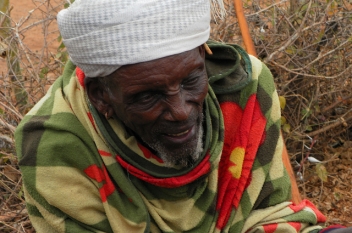 I have just got back from Ethiopia, a country close to me, having worked there in my formative years for Save the Children. I travelled there with Tom Wright, CEO of our sister organisation, Age UK.
I have just got back from Ethiopia, a country close to me, having worked there in my formative years for Save the Children. I travelled there with Tom Wright, CEO of our sister organisation, Age UK.
On our short visit and drive from Addis, the capital, to Borena, 12 hours south near the Kenyan boarder, not everything I saw was negative. Ethiopia is stable with developing infrastructure and investment coming into the country.
However, it remains a country with major challenges. Its huge population growth has resulted in the absolute number of Ethiopians living in poverty remaining very high. Climate change and the dependency pastoralists and farmers have on rainfall also means their predisposition to emergencies remains high.
Living on the edge
A national safety net programme protects some of the poorest, but due to the prolonged drought this year, many pastoralists are living on the edge. Despite the government acknowledging that 4.5 million people need extra support, the systems are not yet in place to respond to such a large group in need.
The visit to Borana highlighted just how vulnerable pastoralists have become. We saw many older people saying they had not experienced a drought like this one in almost 50 years. The households we visited had older people and children living together. They had very little except some grain received from relief agencies.
The villagers we met told us over 70% of their livestock have been lost. The short rains in September/October will be critical. If they are poor, the emergency will become extremely severe and will carry on well into next year.
Providing food and cash
We have played a major role assessing people’s needs in Borana. The means we are looking at; water access improvements, fodder provision and cash distributions will be vital in supporting people in the coming months. With our partners, we will work to provide food and cash grants.
We are also working to ensure that older people and the specific issues they face are visible to other agencies and that their needs are met.
I was encouraged by our work in Ethiopia, but there is more to be done. The refugee crisis in the Somali region of Ethiopia is growing. It is estimated that there will be around 200,000 refugees in the camps by the end of 2012, and unless the situation changes in Somalia people may remain there for some years.
How you can help
Our work is supported by our sister organisation Age UK.
You can help us too by donating to Age UK’s East Africa appeal for vulnerable older Ethiopians and their families affected by the drought. Thank you very much.
Age UK is raising money together with the Disasters Emergency Committee (DEC) for the East Africa Crisis Appeal. The DEC is a consortium of 14 aid agencies working together in times of disasters and emergencies.
